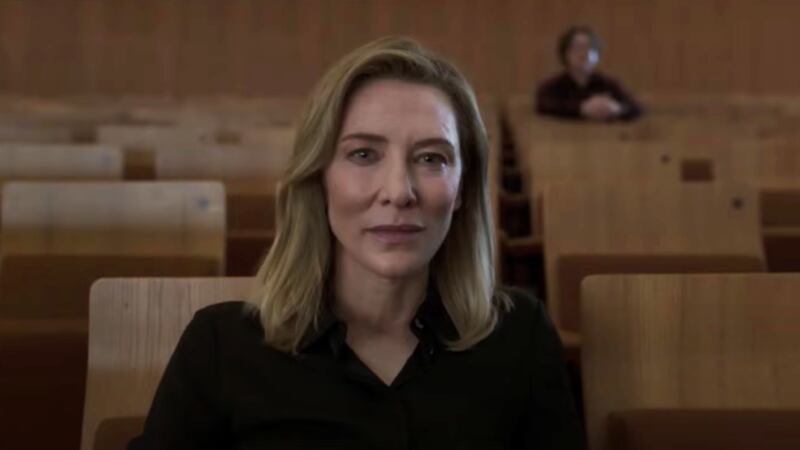TÁR
**** Lydia Tár (Cate Blanchett) is the master of time—or so she says. When asked to explain why a conductor is more than “a human metronome,” Lydia, maestro of the Berlin Philharmonic, says the description is not entirely inaccurate. Under the sway of her baton, time starts, stretches and stops. She’s in control—which is why, inevitably, TÁR must be about her losing control. Written and directed by Portland-raised filmmaker Todd Field (Little Children), the movie finds Lydia on the precipice of a career-crowning, pandemic-delayed performance of Mahler’s Symphony No. 5. Yet despite her success, she’s haunted, not only by ethereal threats (including a growling dog who may or may not be real), but by rumors of sexual impropriety that cloud her reign as the world’s foremost female conductor. Lydia doesn’t behave like an innocent woman—she deletes countless emails from a former protégé who died by suicide—but TÁR has no interest in tidy answers. Delighting in our discomfort, Blanchett and Field morally box us in by making Lydia as lovable as she is despicable. Even when she stares into the abyss of so-called cancellation, she has a strange magnificence (especially during her caterwauling performance of a made-up, accordion-accompanied song called “Apartment for Sale”). Whether the film’s ethics are dubious or simply nuanced promises to be a furiously contested matter of perspective. What won’t be is Field’s directing. As the camera smoothly follows Lydia as she journeys through a tunnel or along a river, you feel your world expanding. Visually, intellectually and emotionally, TÁR is epic-scale cinema. That is why, like its heroine, it will leave you both troubled and awestruck. R. BENNETT CAMPBELL FERGUSON. Bridgeport, Cinema 21.
DECISION TO LEAVE
**** Director Park Chan-wook loves a curse. From revenge (Oldboy) to vampirism (Thirst) to abuse (The Handmaiden), the Korean master often treats character motivations as binding covenants of passion and perversion. So it is with Decision to Leave, for which he won Best Director at Cannes. When a Busan immigration officer falls to his death, his widow (Tang Wei of Lust, Caution fame) and an investigating detective (Park Hae-il) enter a classic noir two-step of suspicion and attraction (a trope deployed by everyone from Hitchcock to Eszterhas). But Park has plenty to add, always emphasizing character over casework: This investigation’s intensity fatalistically marks the participants. Certain elements recall Bong Joon-ho’s Memories of Murder, especially the casting of Park Hae-il, whose boyish beauty is pulverized by his character’s job here. But the film is mostly interested in the detective as an idea—an assembly of attractive, manipulatable qualities, from his dignified-cop mannerisms to extra storage pockets in his slacks. Rest assured, there are jaw-dropping foot chases and skirmishes, but Decision to Leave is mostly Park Chan-wook at deconstructive play. In the long lineage of cops and suspects improperly entwined, here’s a new cosmic joke about relationships: At last, a man who pays attention. NR. CHANCE SOLEM-PFEIFER. Cinema 21, Hollywood.
DARK GLASSES
** The bigger they are, the harder they fall. Legendary Italian mastermind Dario Argento (Suspiria, Deep Red) has had a hand in creating some of the most iconic horror films across decades. However, his latest release, Dark Glasses, is assuredly not one of them. There’s plenty that the film does right, including Dziga Vertov-styled double exposures and anxiety-inducing diegetic music—and it features a powerhouse performance by star Ilenia Pastorelli as an escort blinded by a serial killer. However, no actor or editing team could have saved the movie from its awkward implosion of dialogue (the story’s flatness rivals its heroine’s similar lack of dimension). Worse, Dark Glasses lacks the stamina necessary to string an audience along while setting up scares. Just when you think the film is about to make a turn for the better, scenes end as quickly as they began, rushing toward an illogical conclusion. If you’re looking for a never-ending cycle of disappointment from your next viewing experience, look no further. NR. ALEX BARR. Cinemagic.
TICKET TO PARADISE
** Romantic comedies aren’t crafted to subvert expectations, but to satisfy them with a formula that leaves everyone happy—a formula that’s far more delicate than it’s given credit for. Writer-director Ol Parker (Mamma Mia! Here We Go Again) is no newcomer to this arena (he also wrote The Best Exotic Marigold Hotel). Working with two A-list veterans of the genre, George Clooney and Julia Roberts, he gets Ticket to Paradise off to a fantastic start, but it falls apart from there. Clooney and Roberts play David and Georgia, a bitterly divorced couple forced to reunite for the graduation of their daughter Lily (Kaitlyn Dever) from law school and to see her off to Bali for three months (with the obligatory best-friend character with all the best lines, played by Billie Lourd). When they receive word that Lily is forgoing her law career to marry a local guy she just met and live with him in Bali, they freak and rush to stop the wedding, a plot that never rings true. Lily’s leap of romantic faith is difficult to buy in the modern age, especially without the spark generated by similar characters seeking a contested shotgun wedding in films like Why Him? or Guess Who’s Coming to Dinner. Seeing Clooney and Roberts together, though, is like listening to a new album from a favorite band of your youth. They can still hit those wonderful, familiar notes to satisfy their old fans, but this time, it’s doubtful they’ll attract any new ones. PG-13. RAY GILL JR. Bridgeport, Cedar Hills, City Center, Clackamas, Eastport, Evergreen Parkway, Fox Tower, Living Room, Lloyd Center, Mill Plain, Oak Grove, Progress Ridge, Studio One, Tigard, Vancouver Plaza.
